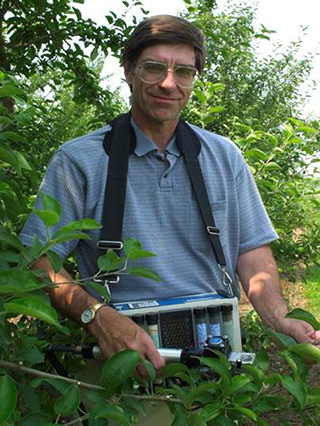
Lakso wins in first USDA Innovations in Food and Agricultural Science and Technology (I-FAST) prize competition [USDA press release]- The U.S. Department of Agriculture’s (USDA) National Institute of Food and Agriculture (NIFA) and the National Science Foundation (NSF) announced November 1 the winners of the first Innovations in Food and Agricultural Science and Technology (I-FAST) $200,000 prize competition. I-FAST helps scientists and engineers broaden the impact of their NIFA-funded research by encouraging collaboration between academia and industry to translate fundamental agricultural innovations into the marketplace. Alan Lakso, emeritus professor in the Horticulture Section, was on of four winners. Lakso and his Cornell team — including Abe Stroock, Department of Chemical and Biomolecular Engineering, Vinay Pagay, PhD Horticulture ’14, and Michael Santiago, Chemical and Biomolecular Engineering graduate student — won for their micro electro-mechanical systems (MEMS) microtensiometer.
CU in Nature website encourages students to get outside [Cornell Chronicle 2016-11-03] – Students can feel overwhelmed by the pressures associated with getting a top-quality education, but a new website and programming aims – by nature – to lower their stress levels. CUinNature.cornell.edu, which launched this fall, is a clearinghouse for the many natural areas on campus, including theCornell Botanic Gardens, most just a short walk away for students. Don Rakow, associate professor in the School of Integrative Plant Science, Horticulture Section, in the College of Agriculture and Life Sciences, is hoping students take advantage of an easily accessible antidote for academic and other stressors.
Geneva project explores ways to improve Northeast grape growing [Station News 2016-10-28] – Jason Londo, adjunct associate professor in the Horticulture Section of the School of Integrative Plant Science and a geneticist in the USDA-ARS Grape Genetics Unit, is teaming up with researchers from across the country to map genetic traits in grapevine roots in order uncover the ways genes interact with the environment. The research aims to optimize the productivity and environmental resilience of grapevines, potentially pointing to new ways to improve grape growing in the Northeast.
Tech brings value to vineyards [periodiCALS, Vol. 6, Issue 2, 2016] – Each morning, the same question greets Cornell Lake Erie Research and Extension Laboratory Director Terry Bates from his office white board: What are you doing for the grape growers? This summer, the answer has come easily. He’s systematically taking the guesswork out of managing vineyards, with help from a fleet of sensors that see the vineyard more clearly than the human eye.


